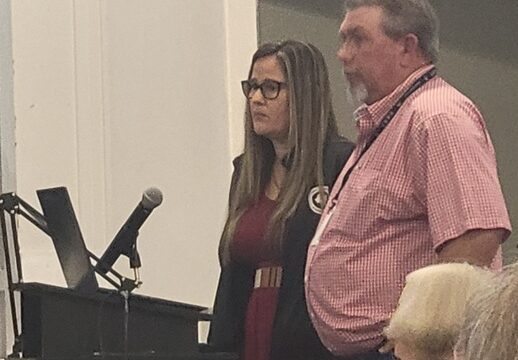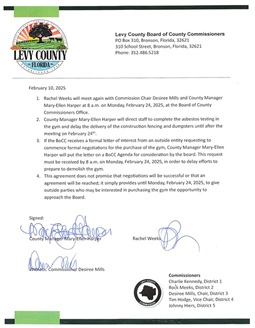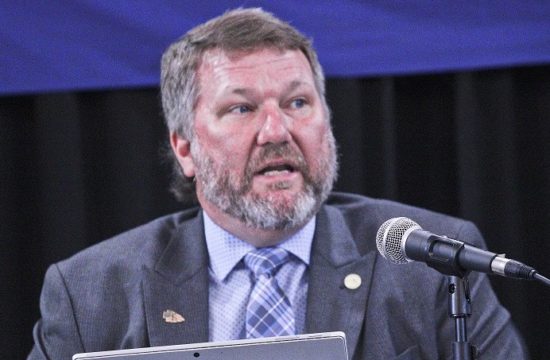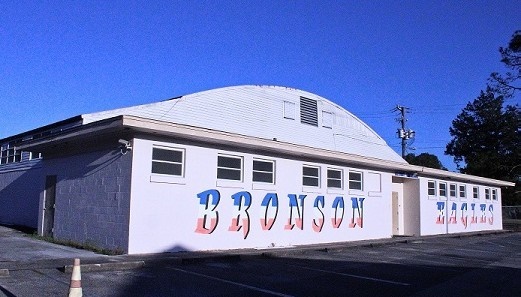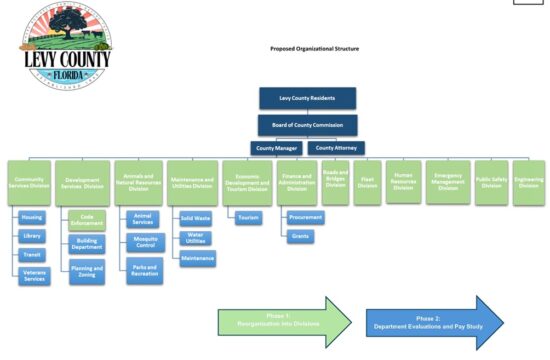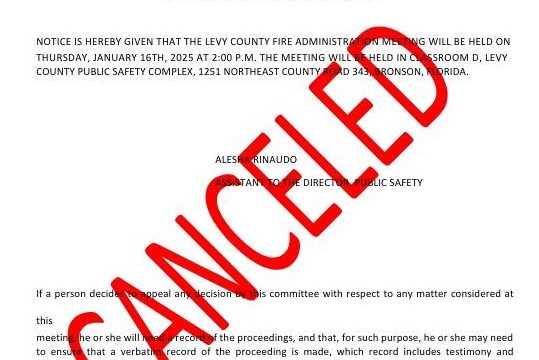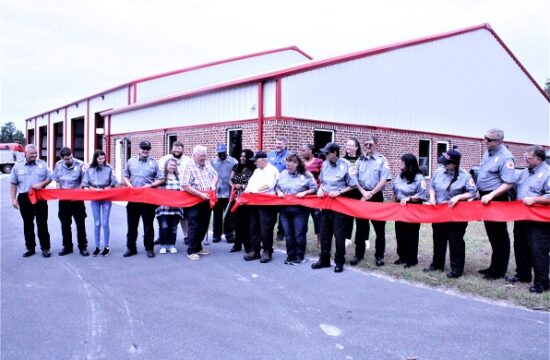By Terry Witt – Spotlight Senior Reporter
Levy County Commissioners voted unanimously Tuesday to send a letter to the Suwannee River Water Management District supporting the formation of a regional water supply cooperative, but were surprised to find out the project would have to be funded by a combination of state grants and a big loan.
Commissioner Desiree Jerrels made the motion to approve the letter but only as a means of finding out how much state grant money was available to fund the project. She made it clear the county wasn’t making any type of commitment to join the cooperative.
The Waccasassa Water and Wastewater Cooperative would provide wholesale water and sewer services to Bronson, Cedar Key, and Otter Creek and would sell water and sewer to the city utilities. The cooperative would set wholesale rates. The cities would retain their water and sewer systems and would set retail rates for municipal customers.
That’s the plan as proposed.
It was always assumed from the beginning by the working group of local officials that met for nearly a year to discuss forming a regional water and wastewater cooperative that Tallahassee was floating with money for such projects and there was a good chance of getting full state grant funding.
But the assumption proved to be incorrect.
County Attorney Nicolle Shalley gave a report to commissioners based on a staff analysis of a workshop meeting a week ago and other research indicating the maximum Alternative Water Funding (AWS) grant for the project wouldn’t cover the full cost of the $100 million-plus project. She said the grant would cover $30-40 million but the remaining $60-$70 million would come from a state loan.
Commissioner John Meeks, who has been actively participating in discussions with a working group that conceived the idea for a regional water and sewer cooperative, said he never favored taking out a loan for the project nor has he heard any discussions about a loan until now.
“From the beginning, it was always said there would be sufficient funding for this project available,” Meeks said. “This is the first time I’ve ever seen that the loan program was the only way.”
Meeks challenged anyone to find a document quoting him as saying he supported taking out a loan as part of the funding for the regional water and sewer cooperative. He then gave a statement that he said might offend some folks, but he said he has always been straightforward about what he says, and he wanted to cover his backside in case anyone tried to claim he ever favored taking out a loan for the project.
“I didn’t sign up for no loan. I said, in the beginning, I wouldn’t sign a loan. I said from the beginning if this wasn’t funded outright it’s not something we want. If anyone can show on the record when I said different than that…that I said yeah, let’s borrow a bunch of money, I’d like to see it,” Meeks said.
With that being said, Meeks said he still believes the concept of developing a regional water supply cooperative is a sound idea. He estimated that if Cedar Key replaced its water and sewer systems, and Otter Creek and Bronson did the same it would cost about $160 million. He said if the regional cooperative comes into being, it would save about a third of those costs. He said all three of those communities need to replace their water and sewer systems.
Shalley said the feasibility study that was done by Water Solutions, Inc. concluded that supplying central water and sewer to the unincorporated communities of Sumner and Rosewood would involve too much piping to reach those sparsely populated rural communities and wasn’t cost-effective. Meeks had tossed out the idea of serving those two communities with water and sewer because the cooperative’s water and sewer lines would be constructed along State Road 24, the highway that runs past both residential areas. If Sumner and Rosewood aren’t served, the county commission wouldn’t have any specific residential service area in the unincorporated part of the county that would tie it into the cooperative. The cooperative’s pipes would pass through the county, but wouldn’t serve any residential areas.
Linda Cooper, founder and administrator of Spotlight on Levy County Government, expressed her opposition to the county commission getting involved in the project. She said the three cities that stand to benefit from the project should shoulder the costs. She was concerned about the county committing to a project that could potentially force county taxpayers living in rural areas, who aren’t part of the project, to pay a portion of the expenses. She didn’t like the concept of a regional cooperative.
“To me, regional means big brother. I handle my own affairs. I’m a sovereign person. I think each municipality should handle their own business. If I choose to live in Cedar Key and the water is bad, so be it. That’s my choice,” Cooper said. “I should not, as a person living in the unincorporated area, have to even think we should be on the hook for this. I asked at the last meeting if the county wanted to be in the water and sewer business – never got a straight answer. The county does operate two utilities that lose $100,000 a year. (Manatee Utilities and University Oaks) You had to take them over because they were private.”
She added that if Cedar Key, Otter Creek, and Bronson can’t sustain their lifestyle, maybe they should halt all construction in those towns or stop issuing building permits until they can maintain their community utilities.
“We as the taxpayers of Levy County don’t want to get involved in this,” Cooper said.
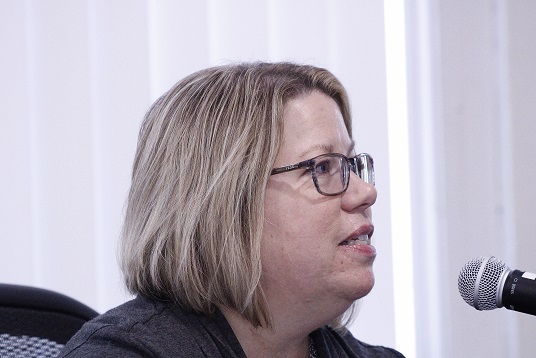
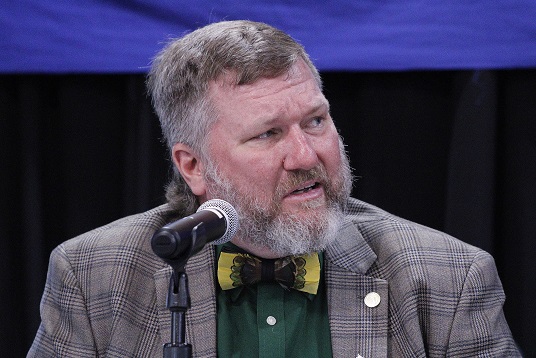
—————————-
Board of County Commission Regular Meeting December 6, 2022; Posted December 6, 2022



